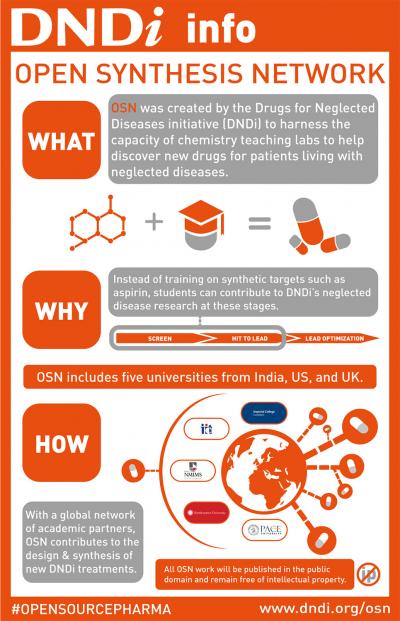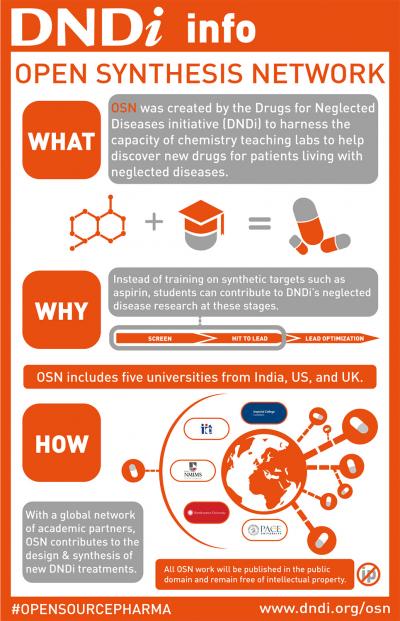
Credit: DNDi
The non-profit research and development organization Drugs for Neglected Diseases initiative (DNDi) has launched a collaborative project with five universities in India, the UK, and the US to harness the capacity of university teaching laboratories and task students with discovering potential new drugs for patients living with neglected diseases.
The Open Synthesis Network (OSN) includes 25 undergraduate and master's students in chemistry from participating universities. During this 2016/2017 academic year, they will work on improving chemical compounds for the neglected disease visceral leishmaniasis (VL).
"Through the Network, students contribute to a real-life medicinal chemistry project with the potential to make a concrete impact with the results of their lab work. Instead of training on more traditional synthetic targets such as aspirin or paracetamol, students can instead produce samples of new chemicals relevant to DNDi's cutting edge neglected disease research," said Ben Perry, Senior Discovery Manager at DNDi. "And DNDi gets to access their creativity and the collective synthetic power of university training in a way that could resolve some of the research and development challenges we are facing in our quest to bring new treatments to neglected patients."
The Open Synthesis Network brings together five universities: the Shobhaben Pratapbhai Patel School of Pharmacy & Technology Management at Narsee Monjee Institute of Management Studies (NMIMS) in Mumbai, India; the Indian Institute of Chemical Technology (IICT) in Hyderabad, India; Imperial College London, UK; Northeastern University in Boston, USA; and Pace University in New York City, USA.
All work generated by OSN will be published in the public domain in real-time and remain free of intellectual property (IP). This is the first example of an Open Source Pharma type approach being used to tackle kinetoplastid diseases such as leishmaniasis.
The OSN process works by DNDi sharing data on existing compounds from one of its active research projects with all university participants, along with a list of new, "wanted" chemical compounds. Students can then explore the existing data, understand the design rationale for the new compounds through open discussion with DNDi experts, and carry out the synthesis for one or more of these "wanted" compounds as part of their lab training. Students can also opt to use the data to make their own designs for new compounds. DNDi will then test all new compounds for anti-parasitic activity, sharing the results openly with all OSN participants.
Students will be working on compounds that kill Leishmania donovani and Leishmania infantum, the parasites that cause visceral leishmaniasis – an illness that kills up to 30,000 people yearly. DNDi's current objective for VL is to discover compounds more suited to oral administration, better suited to use in the field, and with fewer side effects than existing treatments. Successful compounds coming from the OSN project will be evaluated further as part of DNDi's discovery pipeline.
"Students are rarely exposed to real-life projects like this mainly because of IP issues, meaning that work cannot be shared amongst peers." added Ben Perry.
The online nature of OSN readily allows DNDi to open this collaboration to any universities interested in participating. DNDi welcomes requests for further information on the Open Synthesis Network. Please contact: [email protected]
###
About DNDi
A not-for-profit R&D organization, DNDi works to deliver new treatments for neglected patients living with leishmaniasis, human African trypanosomiasis, Chagas disease, specific filarial infections, paediatric HIV, mycetoma, and hepatitis C. DNDi is actively engaged in developing new treatments and screening new compounds, notably for Chagas disease and leishmaniasis. http://www.dndi.org
Press Contact
Ilan Moss (New York): +1 646 266 5216, [email protected]
Lynda Piper-Roche (Geneva): +41 22 907 7 748, [email protected]
Media Contact
Ilan Moss (New York)
[email protected]
646-266-5216
@DNDi
############
Story Source: Materials provided by Scienmag





